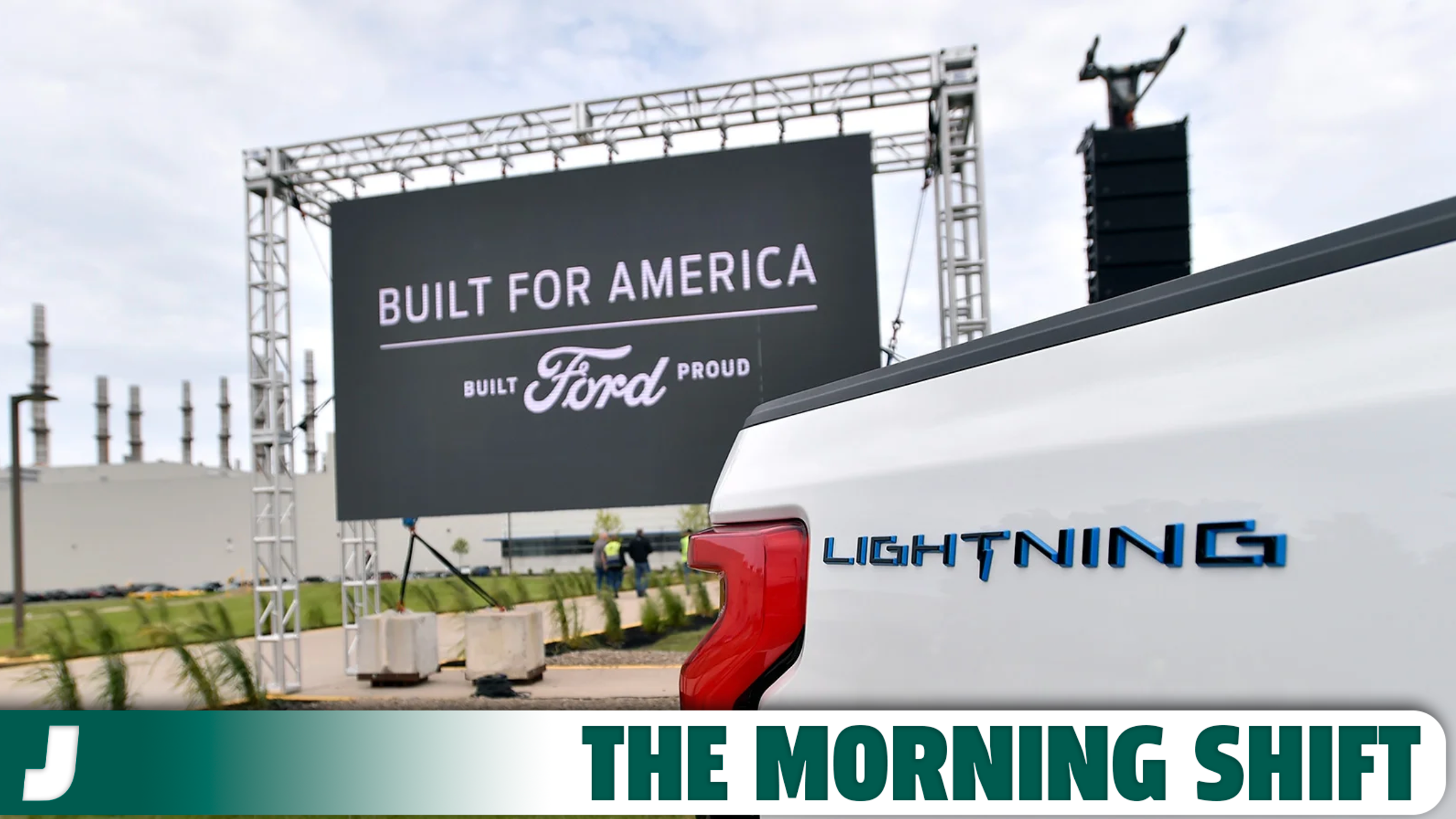Fain: EV Plant Pause 'A Shameful, Barely-Veiled Threat By Ford To Cut Jobs'
Also, the Blue Oval says there are still "significant gaps" in UAW contract talks, and Big Three suppliers are laying off workers.
Good morning! It's Tuesday, September 26, 2023, and this is The Morning Shift, your daily roundup of the top automotive headlines from around the world, in one place. Here are the important stories you need to know.
1st Gear: Ford’s $3.5 Billion Battery Plant Put On Hold
Ford has reportedly paused work on its $3.5 billion EV battery plant in Michigan, saying it's not sure about its ability to competitively operate the plant while it's locked in contract negotiations with the United Auto Workers Union.
As you may have expected, UAW President Shawn Fain was not a fan of this move, slamming Ford and calling the announcement "a shameful, barely-veiled threat by Ford to cut jobs.... We are simply asking for a just transition to electric vehicles and Ford is instead doubling down on their race to the bottom." From Reuters:
Ford in February announced plans to build the plant in Michigan, betting that making the batteries in the United States would help it and Chinese partner CATL attract U.S. customers to embrace a lower-cost technology pioneered in China.
Michigan Governor Gretchen Whitmer said: "Ford has been clear that this is a pause, and we will continue to push for successful negotiations between the Big 3 and UAW so that Michiganders can get back to work doing what they do best."
The UAW and some in Congress want automakers to pay workers at battery plants the same higher wages that workers at assembly and engine plants receive.
This isn't the first time this plant has been in the news. Congressional Republicans have been probing it because of concerns the plant could allow U.S. tax subsidies to flow into China, and it could leave Ford dependent on Chinese tech.
Representative Mike Gallagher, the Republican chair of a House select committee on China, said lawmakers were "encouraged to see Ford take a crucial first step to reevaluate its deal" with CATL. "Now, Ford needs to call off this deal for good," he added.
[...]
In 2022, Congress passed the $430 billion Inflation Reduction Act (IRA), which will bar $7,500 in future consumer EV tax credits if any battery components are manufactured or assembled by a "foreign entity of concern."
Ford has been awaiting guidance to determine if batteries operated by the Marshall plant would run afoul of the requirements.
Ford has reportedly urged the Treasury to take a more narrow view of the restriction, saying that an "overly expansive interpretation" could make clean vehicle credits "largely unavailable."
2nd Gear: Ford Says UAW Talks Have A Long Way To Go
Ford says that despite the fact it has made progress in some areas, there are still "significant gaps to close" on a number of key economic issues before a new deal can be agreed upon with the United Auto Workers union. From Reuters:
The "issues are interconnected and must work within an overall agreement that supports our mutual success," it said in a late evening statement after talks over the weekend.
The UAW, which on Friday cited "real progress" in talks with the No. 2 U.S. automaker, did not immediately comment.
In contrast to Ford, the UAW has expanded strikes against General Motors and Chrysler-parent Stellantis to 38 parts distribution centers across the United States. It was not immediately clear if main table bargaining took place with GM and Stellantis over the weekend.
The strike initially started on September 15 and one assembly plant for each of the Big Three. Additional GM and Stellantis facilities went on to add about 5,600 workers to the 12,700 already on strike.
The Detroit Three automakers have proposed 20% raises over 4-1/2 years, while the UAW is seeking 40% along with 32-hour-work weeks, the return of defined benefit pensions and to eliminate wage gaps separating newer and older employees.
UAW President Shawn Fain said last week that Ford had improved its contract offer. It includes a boost to profit sharing and agreeing to let workers strike over plant closures, but he added that the union still has serious issues to resolve.
3rd Gear: Supplier To Lay Off Workers Amid Strike
An automotive supplier in Wixom, Michigan, announced it could be laying off a "substantial portion" of its 171 hourly workers because of "unforeseen business circumstances." It comes as similar suppliers are blaming the UAW strike for financial challenges.
This move could reportedly become more common as the strike against Ford, GM, and Stellantis moves into its second week. From The Detroit Free Press:
In a document filed Thursday with the state, Eagle Industries, Inc. indicated "total laid off" employees as 171. The move affects plant workers, production and administration employees.
"As a result of unforeseen business circumstances, we are providing information in anticipation of a potential layoff at the worksite. The estimated number of workers is subject to change due to evolving business circumstances," the company said in a statement provided to the state.
But Eagle Industries President John Bull said his company filed the paperwork as a precaution. While they employ approximately 171 hourly workers, he said any possible layoff would likely affect 55 to 60 employees.
Bull reportedly said the move is "100 percent" related to the strike, saying that in general, his business is actually hiring employees. After all, every OEM relies on third-party suppliers like this one for car parts and materials.
The company specializes in foam products for the automotive and other industries, according to its website. That includes a product called "EagleZorb," used in components for vehicle doors, trim and other areas to help prevent injuries. Although there is no mention of specific clients on its website, an association that recognizes companies in the field noted Eagle components have been used in Ford vehicles.
Experts reportedly say that the downstream impact of the strike on related industries could be very problematic. An analysis at the University of Michigan (go Penn State) predicts that 150,000 people in Michigan could lose their jobs if the strike lasts four weeks.
Seems simple then, if the Big Three don't want thousands of people out of work, they should give their employees what they deserve.
4th Gear: Hyundai, Kia Cut South Korean EV Prices
Hyundai and Kia are slashing prices on some of their electric vehicles as the South Korean government expands subsidies in an effort to boost a shrinking demand for EVs in the country.
Hyundai will reportedly cut prices for the Ioniq 5, Ioniq 6 and Kona EV. At the same time, Kia will slash MSRPs on the EV6, Niro EV and Niro Plus. The discounts are set to go into effect next month, and they will run through the end of 2023 to take advantage of the subsidy expansion. From Bloomberg:
Demand for EVs, which are generally more expensive than gas-powered vehicles, slowed in South Korea this year amid sagging economic growth, said Lee Hang-Koo, head of Jeonbuk Institute of Automotive Convergence Technology. The latest cuts may intensify the burgeoning price war in the country's auto market, which is dominated by Hyundai and Kia.
"A price war will intensify next year in Korea as foreign carmakers may release new models," Lee said. "US or European brands made in China could draw popularity."
The South Korean competition really started back in July when Tesla began selling its made-in-China Model Y for $44,000. This month, Korean brand KG Mobility launched an electric SUV in partnership with China's BYD for just $30,000.
The number of EVs sold in Korea during the first eight months of the year fell to 67,654 from 71,744 a year earlier, the Ministry of Environment said, citing the decline as a reason for the subsidy hike. The Seoul city government budgeted for subsidies for 13,688 EVs this year, but has covered just 5,522 vehicles so far, official data show.
[...]
The cuts could also add to global tension over the price of EVs. The program will make some cars as much as one-third cheaper in South Korea than in other countries. For example, Hyundai's Ioniq 5 will sell for 46 million won ($34,100), a discount of 8%, or 4 million won, from its original price. Residents of Seoul will be able to get it for even less — about 40 million won — when local subsidies are included.
The same car starts at $41,450 in the U.S. before you take other governmental subsidies into account, according to the outlet.
Neutral: I Saw Two Zebras
Pretty cool, right?

